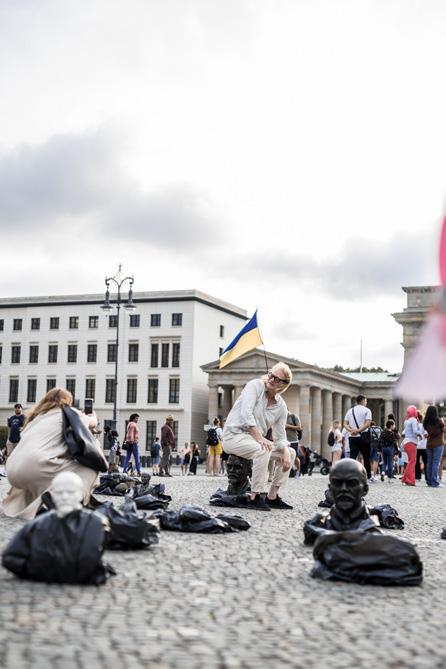
15 minute read
Vitsche

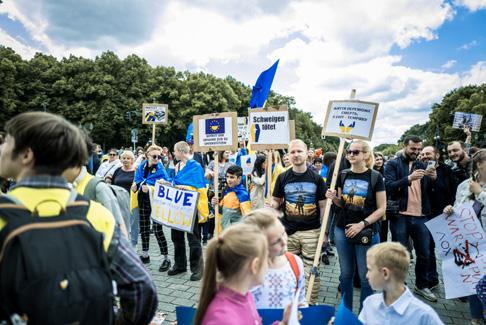
Advertisement
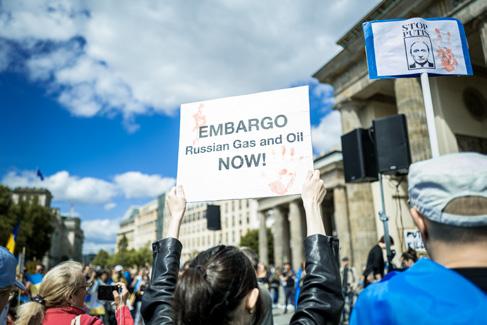


IN CONVERSATION WITH VITSCHE
Interview by Johanna Urbancik Photos provided by Julia Sonata & Chris Knickerbocker.
IF YOU’VE GONE TO ANY UKRAINE-PROTEST IN BERLIN, YOU’VE PROBABLY COME ACROSS THEM. THEY WERE ACTIVE FROM THE SECOND TENSIONS ROSE AND HAVE DONE SEEMINGLY EVERYTHING POSSIBLE TO SPREAD THE MESSAGE IN BERLIN. WE CAUGHT UP WITH KRISTA, VITSCHE’S PRESS MANAGER, TO TALK TO HER ABOUT THE MEANING OF VITSCHE AND HOW A YOUNG GROUP OF PEOPLE HELPED TO CREATE SUCH A BIG SENSE OF COMMUNITY.

Krista: It's a very old word in the Ukrainian language, already present in the early stages of Ukrainian society since around the sixth century. It's a council that makes decisions and changes together to represent a community. That’s why we named our organisation like that. It’s of big significance in the Ukrainian heritage and has become ever more important since 2014.
It's the perfect name for an organisation like yours. Have you been active since 2014? Or did you start around February earlier this year?
Krista: We started in January 2022 and organised the first protests, when it was already notable that tensions ran quite high at the borders. We asked the European Union and Germany for sanctions and to send weapons in advance, so Ukraine would be prepared in case something happened. Of course, the protests before the 24th of February were quite small. We were in front of the Russian Embassy and the Brandenburger Tor. No sanctions and no weapon deliveries from Germany were happening at this time. But then, on the 24th of February, we came together and organised the first big protests. And from that on, we organised one or two protests every week until July. Now, we cut back because of the summer break. Each one of your protests, as you said, has a message and a sense of community, which I think is very interesting and unique.
Can you tell me a little bit about the Ukrainian community in Berlin before February?
Krista: In Berlin, there was a Ukrainian community before. Some Ukrainian organisations have been providing aid to Ukraine since at least 2014, such as Ukraine-Hilfe Berlin e.V., and Plast. . I think some activists, who are a little older than us, tried to build a community, but as far as I know, there wasn’t that big of a Ukrainian community here. Before the full-scale invasion, Ukrainians were more present in the so-called post-Soviet places. Now, most Ukrainians are distancing themselves from this community, as it's often very hostile to Ukrainians, and we don’t feel understood. It’s also not good for Ukrainian subjectivity. Since February, everything has changed. So, of course, a lot of people came to Germany. We're speaking about one million refugees from Ukraine now.
A lot of them came to Berlin.
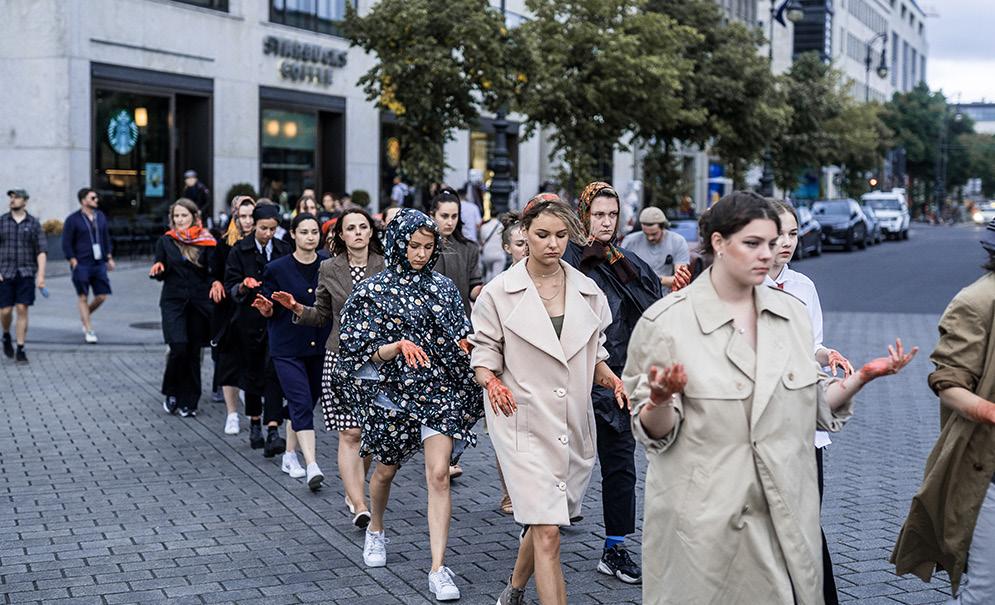
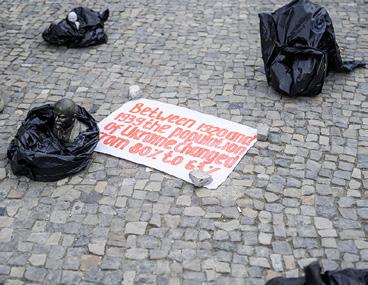

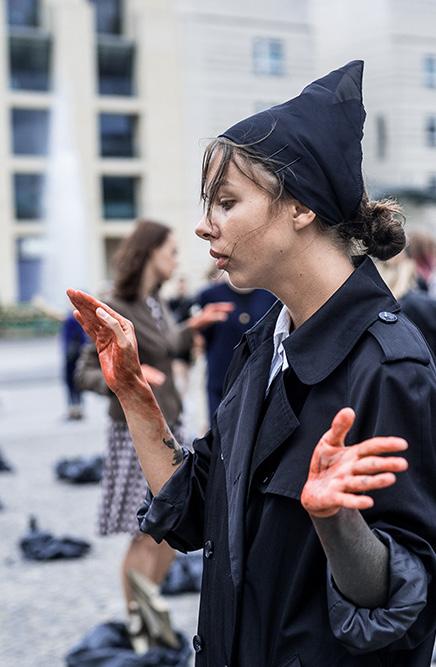

Now, we have a very huge and very strong community with a strong identity. We're Ukrainian, we don't want to be simply defined as post-Soviet, we have our own culture, heritage, and identity. This perception of subjectivity among the diaspora was not as strong before 2022.
So, Vitsche came about around a month before the full-scale invasion. How did you cope with that sudden influx of refugees? It must have turned into a full-time job from one day to another with you being thrown from living a relatively normal life, to having to deal with war. How did you, as an organisation, deal with that?
Krista: It was chaotic. We weren’t an official NGO yet in the beginning, which made it difficult for us to raise money. If we wanted to raise money, we had to do it through the bank accounts of NGOs we helped with communication work for their fundraising campaigns From one day to another, we had a lot of people who were scared about their relatives, the threat to Ukrainian identity and the uncertainty of what was going to happen. We experienced this huge amount of grief, and Vitsche helped a lot of us to connect, help and feel useful. Just like that, people s uddenly had 12- to 14-hour work days, some even quit their jobs or paused their studies, so they could help out full-time, while others helped out on top of a full-time job. Some even had to change jobs because their employers weren’t happy with their side engagements. It had a big impact on all of us. We now have this term called “War-LifeBalance”, which sums up this chaotic state in the beginning. We were working non-stop and didn’t have any time to process. So many of us don't even remember the first weeks or months of the invasion, there was just no time to think about what's going on.
I know what you mean. The last six months seem like they've gone past very, very quickly, but at the same time, a lot has happened. Out of curiosity, are there only Ukrainians working at Vitsche?
Krista: It's mostly Ukrainians. We have some Germans and other nationalities helping out, but I would say it’s 90% Ukrainians. Are some of the refugees who are now based in Berlin working with you too? I remember going to one of your protests with my friend from Kyiv, and he recognised a couple of people.





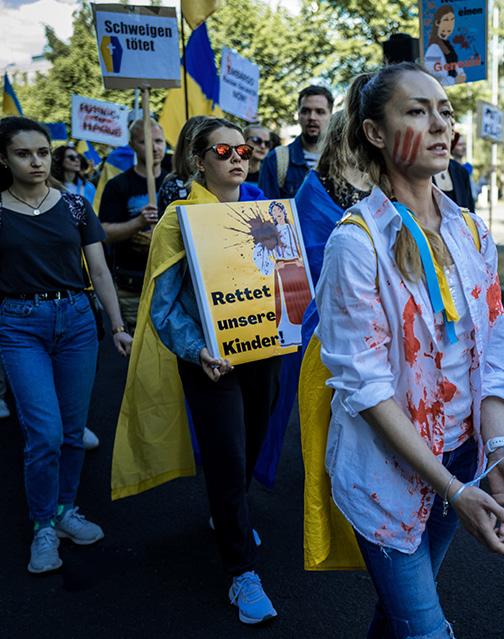

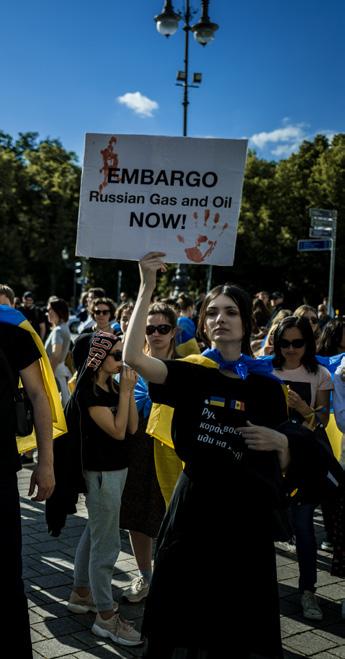
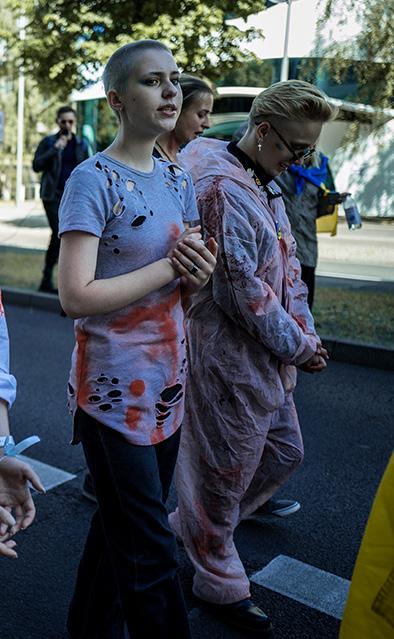
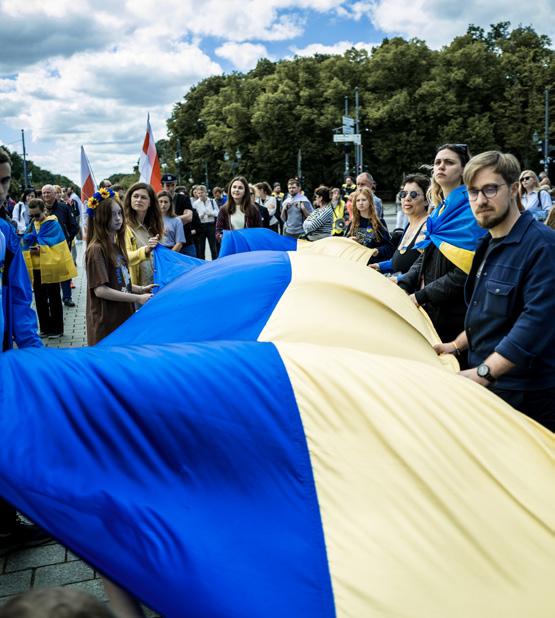

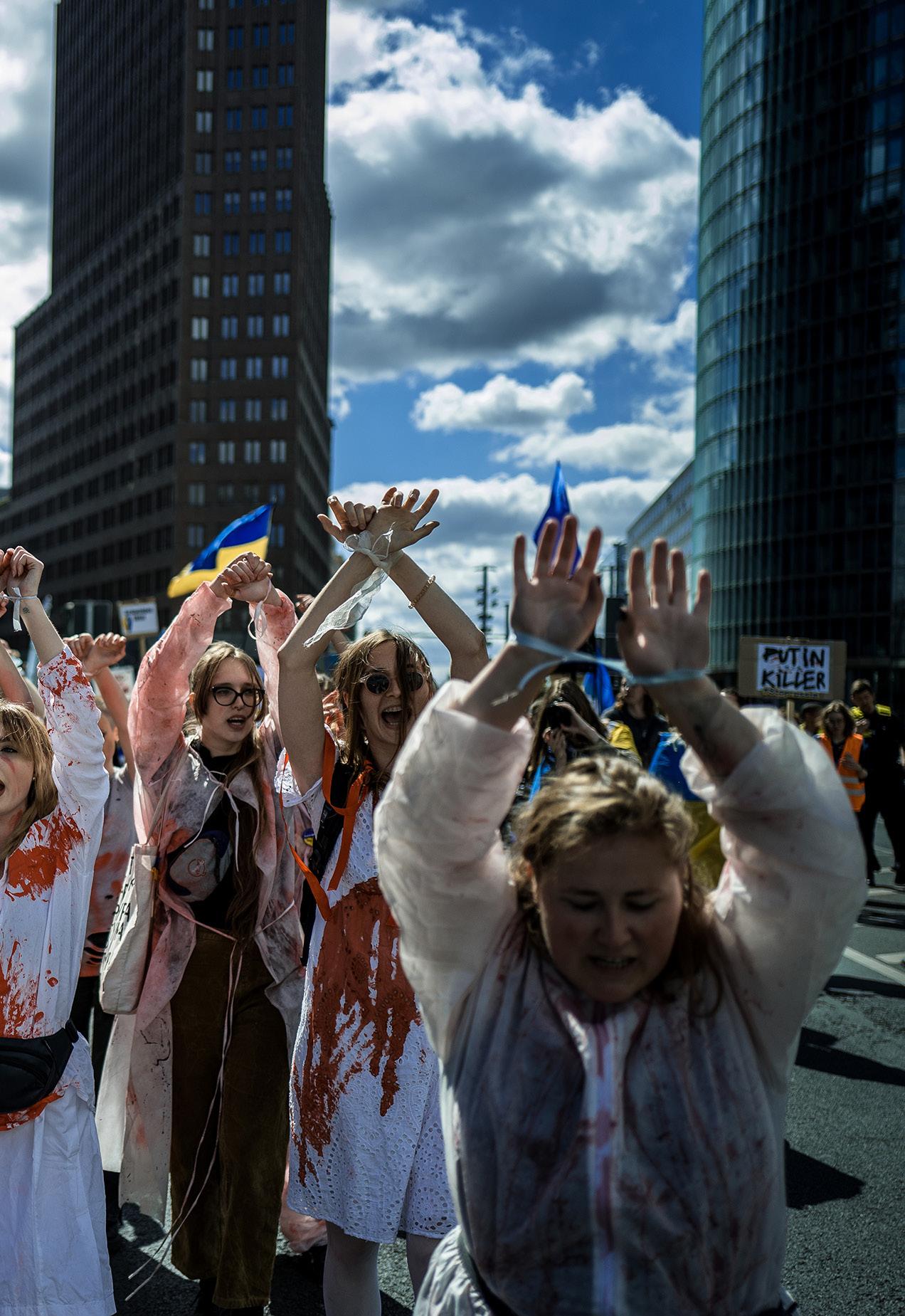

Krista: Exactly! We have a lot of refugees in the team. It changed a lot, though, because, in the beginning, everyone was activated and wanted to do as much as they could when they arrived. But then, people got overwhelmed and didn't want to be confronted with the war all the time, they needed distance because it was too much for them emotionally. Some people also went back to Ukraine. As a core team, we haven't changed much.
How do you deal with the fact, that the conversation about Ukraine is slowly getting less?
Krista: It was one of the toughest realisations when we saw that throughout the summer. It seemed people stopped caring as much as they did in the beginning. I'm working with the media, so I noticed that people started losing interest in July. The conversation is now focused on Germany – on the rising gas prices and the energy crisis. That’s fair. But sometimes it seems there is this lack of understanding of how bad it still is in Ukraine. A lot of people were very hurt and took refuge in the community because here, everyone is still speaking about it doing as much as they can. We don't have that if we leave our Ukrainian space. When talking to German friends, politicians or journalists, it is noticeable that it’s not the top priority anymore. Of course, that’s normal on the one side, but if you're personally affected, it hurts. Since the influx of Ukrainian refugees, there’s been a big conversation about racism in Germany and how Ukrainian refugees are treated fairer and better than other refugees. Have you received any criticism like that?
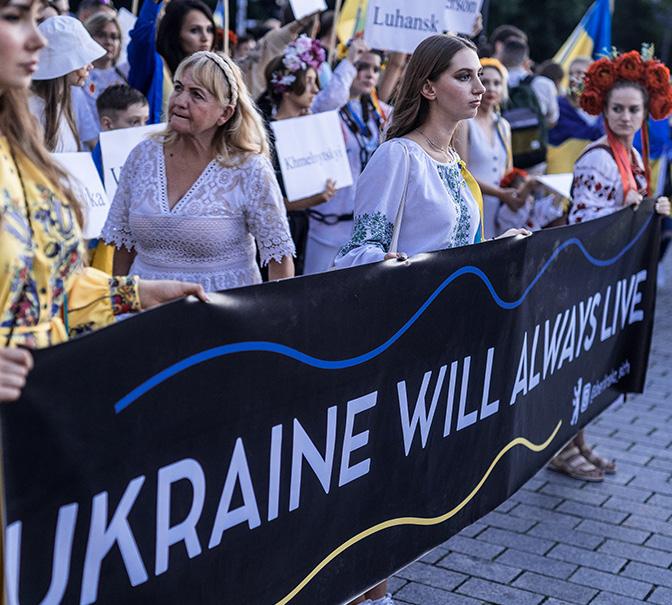
Krista: No, we didn’t. We are also working with an organisation that is taking care of refugees that have a different citizenship, not EU or Ukrainian, and supports BIPOCs that were living in or/and studying in Ukraine. As organisations, we have different struggles. The “Third country nationals” have it much tougher in Germany. The conversation about how much systematic racism they face here isn’t big enough. There were a lot of headlines at the beginning of the full scale invasion about how they were treated at the borders. But, there was no outcry about how they are treated in Germany by German officials or by the German system. This is a big problem because here come the main challenges—for example when it comes to paragraph 24. Together with other organizations we fight for every person that fled from the Russian war in Ukraine and faces systematic discrimination in Germany.
What can we expect from Vitsche in the upcoming couple of weeks and months?
Krista: Early September, we had a small team in Lviv doing our theatre performance at a festival. We stay in touch with Ukrainian organisations, civil society and the culture sector to understand what is needed in our home country and how we can help
In a way you’re the German representatives in Ukraine.
Krista: From the civil society, yes, in some way.




Keep up with Vitsche on Instagram @vitsche_berlin, or explore their resources and projects via their website: vitsche.org

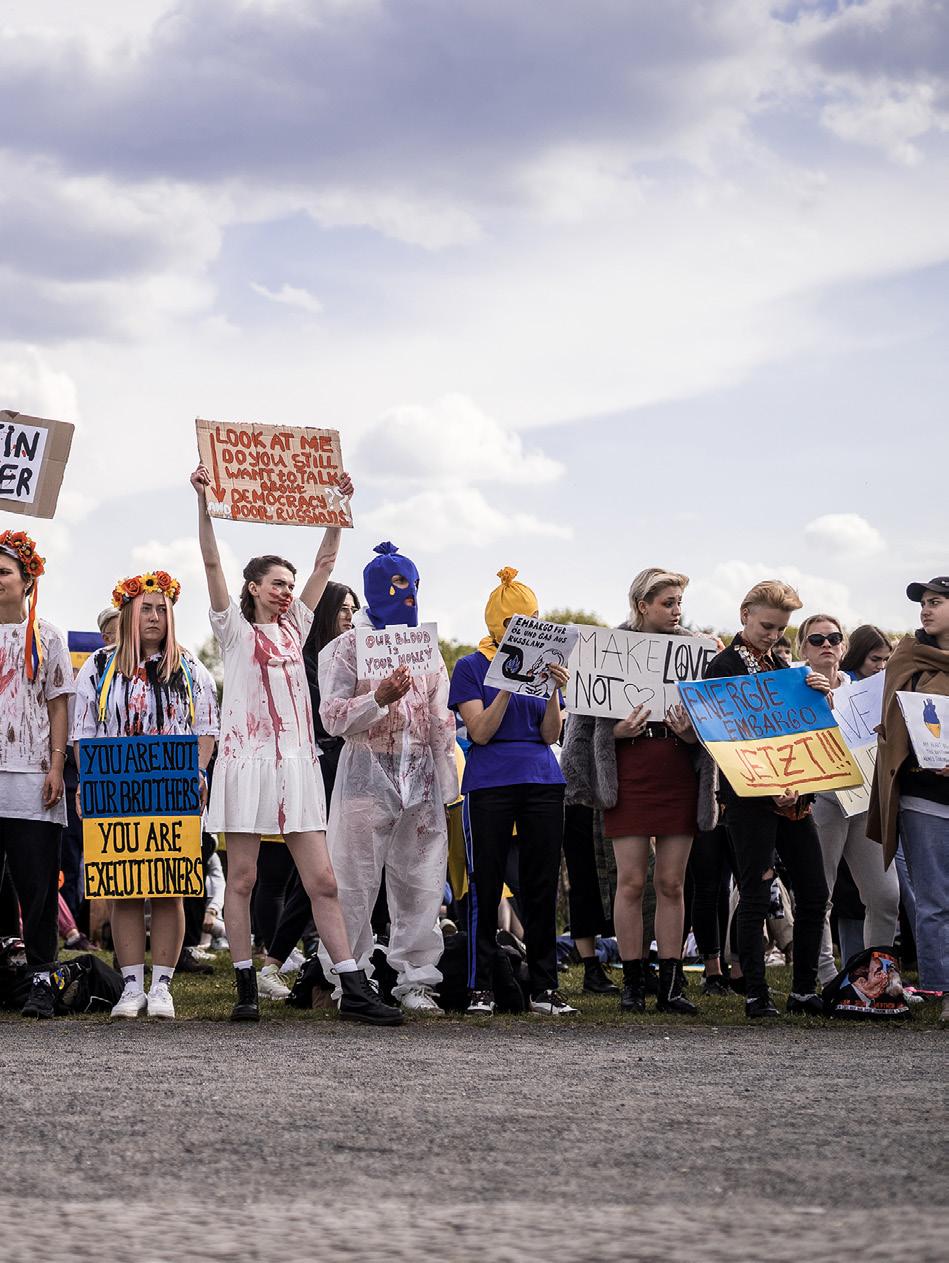
EDUCATE YOURSELF
01
Jasmina Kuhnke is an unmistakable voice in the fight against racism in this country. In her first novel, she talks about what it does to you to always stand out. The protagonist of her book, a black first-person narrator, grows up on the outskirts of the Ruhr area in the 1990s. At home, a violent stepfather rages, at school there is little support, but a lot of exclusion.
At a children ' s birthday party, a neo-Nazi suddenly appears in the door when the bell rings. The protagonist knows what it' s like to expect the worst every day until the worst becomes a given. Where doors open for others, they close more and more for the first-person narrator until she herself is convinced that she has nothing to offer the world. She gets into a violent relationship, cementing the dependency with two pregnancies. Only when it is almost too late does she manage to free herself and the children. Kuhnke ' s book shows how racism weaves itself into the souls of the people affected. It won 't let anyone go anytime soon because it hurts.

SCHWARZES HERZ BY JASMINA KUHNKE
GET IT VIA
02
In 2018, Ahmed M. Badr – an Iraqi-American poet and former refugee - traveled around the world to gather narratives and creative contributions from dozens of displaced young refugees living in camps as well as those adjusting to life after resettlement.
While the Earth Sleeps We Travel is a collection of young voices -including Badr’s own poetry- that explore the concept of “home” and the complexities of displacement.
WHILE THE EARTH SLEEPS WE TRAVEL BY AHMED M. BADR
GET IT VIA

WWW.EARTHSLEEPSWETRAVEL.COM 03
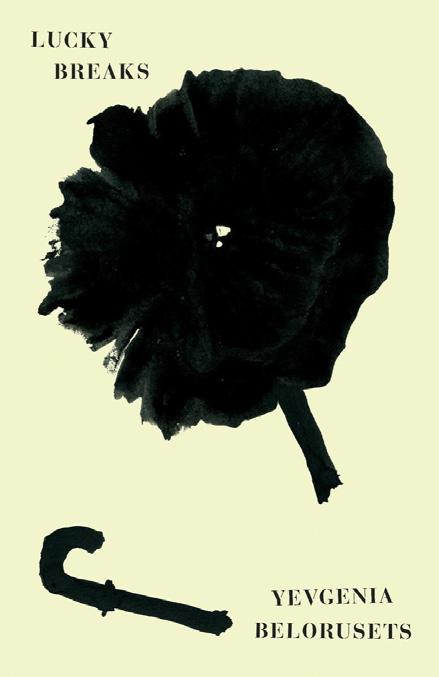
Out of the impoverished coal regions of Ukraine known as the Donbass, where Russian secret military intervention coexists with banditry and insurgency, the women of Yevgenia Belorusets’s captivating collection of stories emerge from the ruins of a war, still being waged on and off, ever since the 2014 Revolution of Dignity. Through a series of unexpected encounters, we are pulled into the ordinary lives of these anonymous women: a florist, a cosmetologist, card players, readers of horoscopes, the unemployed, and a witch who catches newborns with a mitt. One refugee tries unsuccessfully to leave her broken umbrella behind as if it were a sick relative; a private caregiver in a disputed zone saves her elderly charge from the angel of death; a woman sits down on International Women’s Day and can no longer stand up; a soldier decides to marry war. Belorusets threads these tales of ebullient survival with a mix of humor, verisimilitude, the undramatic, and a profound Gogolian irony. She also weaves in twenty-three photographs that, in lyrical and historical counterpoint, form their own remarkable visual narrative.
LUCKY BREAKS BY YEVGENIA BELORUSETS


chereshnivska.com www.instagram.com/chereshnivska
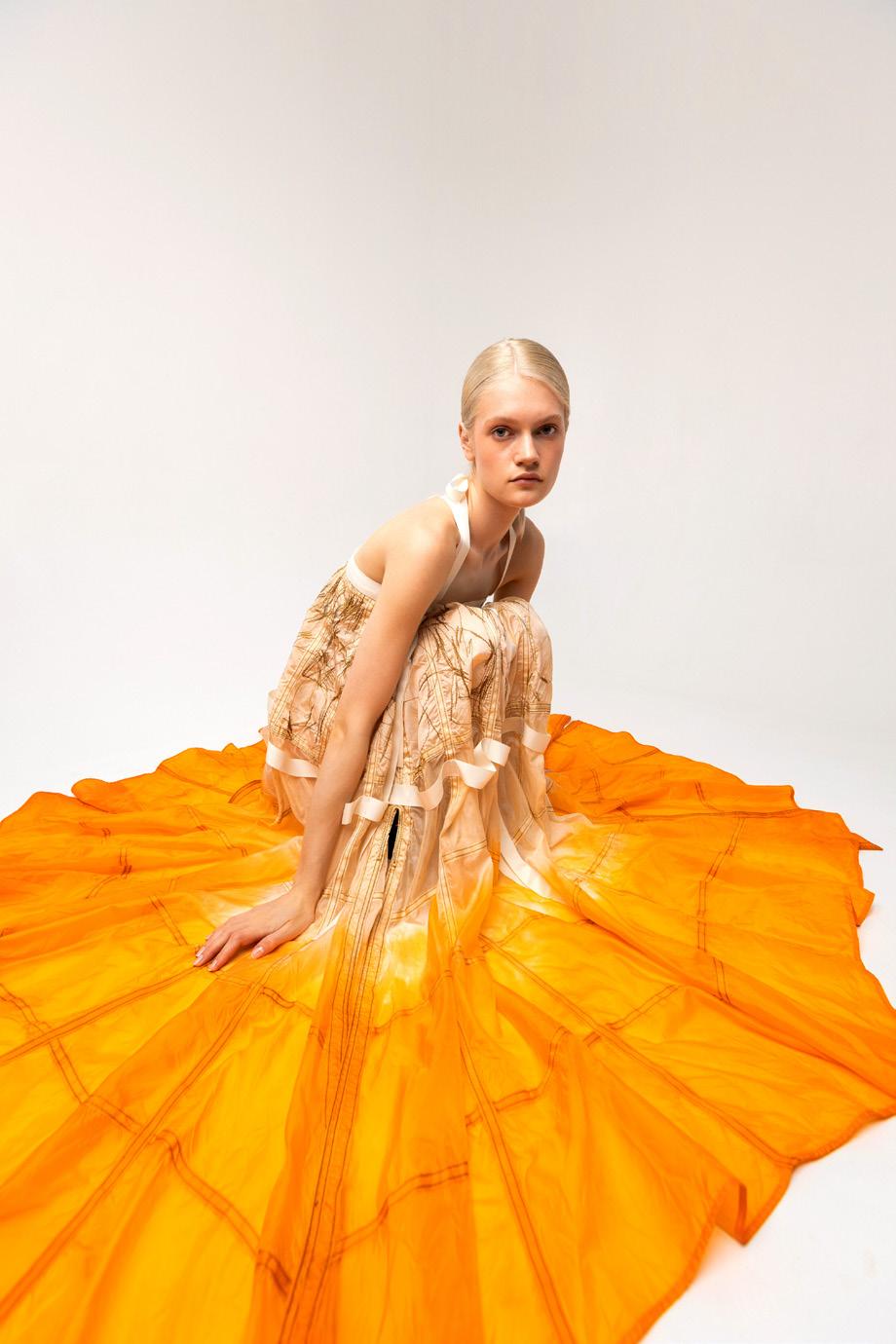
CHERESHNIVSKA
"First of all, I wanted to support everyone who is currently experiencing it and remind them that they are not alone in this "journey" . At the same time, we want to once again draw attention to the war in Ukraine. After all, art is also a weapon, - noted the designer of the brand Anastasiya Rozava, - The real experience of our team is daily air alarms and the unknown. We are gloomy, but with a fighting spirit, so the collection is flashy and bold.
D U R I N G H E L S I N K I F A S H I O N , W E E K T H E U K R A I N I A N B R A N D C H E R E S H N I V S K A P R E S E N T E D A N E W S U S T A I N A B L E C O L L E C T I O N 2 4 0 2 D E D I C A T E D T O T H E R E C E N T E X P E R I E N C E S O F T H E I R N A T I O N . T H E I M A G E S I N T H E S H O W , O N E B Y O N E , C O N V E Y T H E S T A T E O F A E U R O P E A N P E R S O N I N W H O S E H O M E W A R H A S C O M E . E U R O P E A N S , B E C A U S E T H E Y A R E U K R A I N I A N S . T H E
C O L L E C T I O N I S A S Y M B O L O F It all starts with vulnerability T H E E M O T I O N A L S T A T E O F A N and panic. Dark purple, E N T I R E N A T I O N T H A T I S burgundy and orange outfits D E S P E R A T E L Y F I G H T I N G F O R open the collection. Next we A N O R M A L L I F E . see transparent fabrics and textures. This is a break, a limit, a bare nerve. Then comes the phase of acceptance and imitation of normal life.
Сoffee on the way to work, walking with loved ones and planning for the future.
But night air alarms and missile attacks are continuing. So the collection ends with grey and black tones, - prints of explosions and clouds of smoke over Ukrainian cities.
Some looks were created in collaboration with Tereza Barabash, a Ukrainian textile artist. She created a series of lightweight hand woven fabrics from the pieces that would otherwise end up unused.



Tereza's works are in museums and private collections all over the world. Other looks are made from second-hand items, vintage parachutes and organic textiles.
Deconstructivism and asymmetry reinforce the main idea of the collection. The oversized styles and straight cut make it gender neutral. Music for the show by Yuri Dyadka helps the viewer emotionally immerse for a few minutes.
The 2402 collection will be available for pre-order in September 2022. Existing collections can be purchased now on the brand's website.
"We believe that design combined with artistic value and a sustainable practice will always matter.
CHERESHNIVSKA a is a Ukrainebased unisex brand founded in 2016. We are focusing on innovations and sustainability. Till 2024, 50% of production will be made from recycled items. All our designs are available in very limited quantities.
Most feature the unique hand-drawn prints by our creative director Anastasiya Rozava. Every collection is driven by a strong core idea, yet still open for an interpretation. We try to reflect the modern world and show it through the designs and prints."







